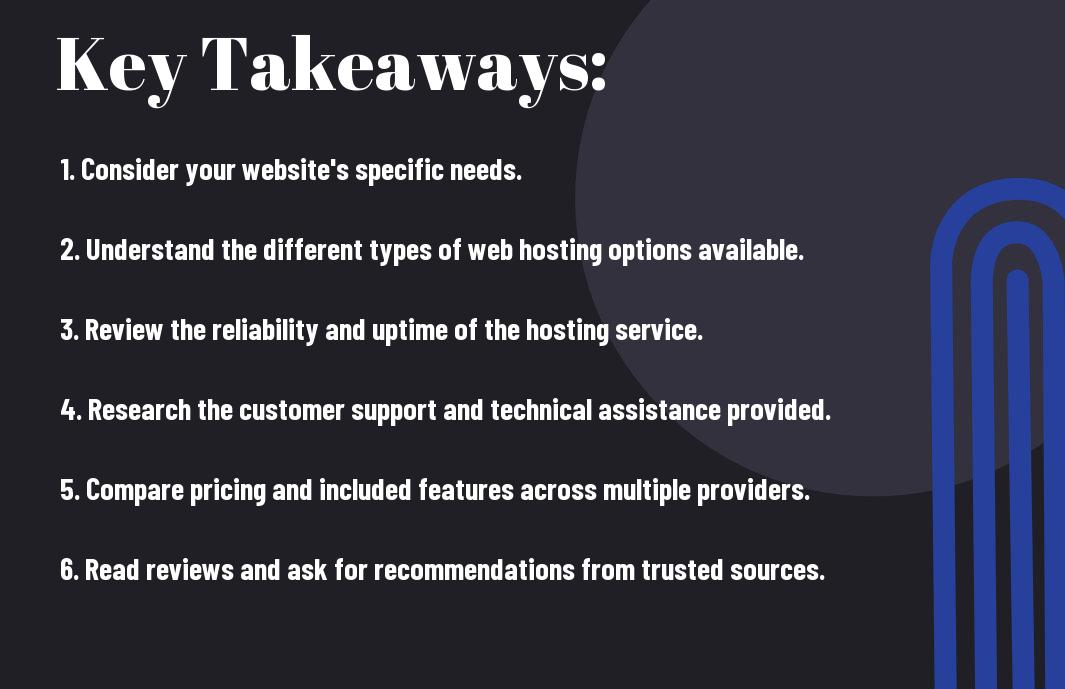When it comes to establishing a strong online presence for your business, one of the most essential decisions you’ll make is choosing a web hosting service. However, this is also a decision that many business owners frequently get wrong. Making the wrong choice can result in downtime, slow loading times, poor security, and a plethora of other issues that can hurt your business. In this blog post, we will discuss the most common mistakes that business owners make when choosing a web hosting service and provide you with expert tips on how to avoid them. By the end of this post, you’ll be equipped with the knowledge to make an informed decision that will benefit your online presence and your business in the long run.
Key Takeaways:
- Research thoroughly: Take the time to research various web hosting services and read reviews from reliable sources to make an informed decision.
- Consider your specific needs: Understand the requirements of your website, such as traffic volume, storage space, and performance, and choose a web hosting service that can cater to these needs.
- Look beyond price: While cost is important, don’t make it the sole factor in your decision. Consider the quality of service and customer support offered by the web hosting provider.

Evaluating Your Hosting Needs
One of the most important steps in choosing a web hosting service is evaluating your specific hosting needs. By understanding your website’s requirements and expected traffic, you can make an informed decision and avoid common pitfalls.
Assessing Your Website’s Technical Requirements
Before selecting a web hosting service, you need to assess your website’s technical requirements. Consider the programming languages and databases your website uses, as well as any specific software or applications it relies on. Be sure to also take into account your storage and bandwidth needs, as well as the potential for growth in the future. Understanding these technical requirements will help you find a hosting service that can support your website effectively.
Estimating Traffic and Scalability Concerns
Another crucial aspect of evaluating your hosting needs is estimating your expected website traffic and scalability concerns. Consider the amount of traffic your website is likely to receive, as well as any anticipated spikes in traffic due to promotions or events. Additionally, think about the potential for your website to grow and the need for scalability in terms of resources. By taking these factors into consideration, you can choose a hosting service that can accommodate your traffic and scalability needs.
By carefully assessing your website’s technical requirements and estimating your traffic and scalability concerns, you can make a more informed decision when choosing a web hosting service. Remember to consider the most important elements such as your specific programming languages and databases, as well as the potential for growth and scalability. This will ensure that you avoid common mistakes and find a hosting service that meets your needs effectively.
Choosing the Right Type of Hosting Service
For a detailed guide on avoiding common mistakes when choosing a web hosting service, you can check out this article on Avoid These 6 Common Mistakes in Website Hosting. Now, let’s talk about the different types of hosting services available to you. When choosing a hosting service, it’s crucial to understand the differences between shared, VPS, and dedicated hosting, as well as the advantages of cloud hosting.
Shared vs. VPS vs. Dedicated Hosting
When considering the type of hosting service for your website, it’s essential to understand the differences between shared, VPS, and dedicated hosting. With shared hosting, your website is hosted on a server that is shared with other websites. This can lead to slower performance during peak times and potential security risks. On the other hand, VPS (Virtual Private Server) hosting offers more stability and control than shared hosting. You have your own virtual space on a server, which provides better performance and security. Dedicated hosting is the most powerful and expensive option, giving you complete control over a server dedicated to your website. It’s ideal for large, high-traffic websites that require maximum performance and security.
Cloud Hosting and Its Advantages
Cloud hosting is a scalable and flexible option that offers numerous advantages. Your website is hosted on a network of virtual servers, allowing for seamless scalability and better uptime. Cloud hosting also provides better security and performance, as your website is not reliant on a single physical server. This type of hosting is ideal for growing websites that need the ability to scale resources as needed. Additionally, you only pay for the resources you use, making it a cost-effective option for many businesses.
Key Features to Look For
Your website’s success is heavily dependent on the web hosting service you choose, so it’s crucial to pay attention to the key features of the hosting providers you are considering. Here are some essential features to look for when choosing a web hosting service:
- Uptime Guarantee: Ensures that your website will be accessible to visitors at all times.
- Server Reliability: Reliable servers and infrastructure to prevent downtime and keep your website running smoothly.
- Good Customer Support: Responsive and knowledgeable customer support is crucial for addressing any issues that may arise.
- Service Level Agreement (SLA): Clearly defined SLAs that outline the level of service you can expect from the hosting provider.
- Scalability: Ability to easily upgrade your hosting plan as your website grows.
The above features are critical for the seamless operation of your website and can impact its performance and user experience.
What are the most common mistakes to avoid while buying hosting?
Uptime Guarantees and Server Reliability
When it comes to web hosting, ensuring that your website is consistently accessible to your visitors is of utmost importance. Look for hosting providers that offer a high uptime guarantee, typically 99.9% or higher. Additionally, server reliability is crucial to prevent downtime and ensure that your website is always up and running smoothly.
Customer Support and Service Level Agreements (SLAs)
Having access to responsive and knowledgeable customer support can be a lifesaver when you encounter technical issues with your website. Look for hosting providers that offer 24/7 support and various support channels. Additionally, make sure to review the Service Level Agreement (SLA) to understand the level of service you can expect from the hosting provider.

Additional Considerations
After considering the essential factors for choosing a web hosting service, there are some additional considerations that you should keep in mind to ensure you make the best decision for your website.
Security Measures and Backups
When selecting a web hosting service, it’s crucial to prioritize security and backups. Your website’s security is of utmost importance, and a reliable hosting provider should offer robust security measures, such as firewalls, malware scanning, and SSL certificates to protect your data and the data of your site’s visitors. Additionally, regular backups of your website’s data are essential to ensure that you can quickly restore your site to a previous state if any unexpected issues occur. Make sure that the hosting service provides automatic and frequent backups to safeguard your website’s information.
Understanding and Comparing Pricing Plans
When evaluating web hosting services, it’s important to understand and compare the pricing plans offered by different providers. You should carefully review the features included in each plan, as well as the pricing structure, to determine which option best suits your needs and budget. Keep in mind that the cheapest option may not always be the best choice, as it may lack essential features or support. Consider the scalability of the plans as well, ensuring that you can easily upgrade as your website grows.
Comparison of Pricing Plans
| Features | Pricing |
| Shared Hosting (Limited resources, suitable for small websites) | $5 – $10 per month |
| VPS Hosting (Dedicated resources, more flexibility) | $20 – $50 per month |
| Dedicated Hosting (Maximum performance and control) | $100+ per month |
Conclusion
Considering all points, it is crucial that you carefully consider your specific needs and requirements when choosing a web hosting service. By avoiding common mistakes such as not researching adequately, not considering scalability, and disregarding customer support, you can ensure that you select a web hosting service that is reliable, secure, and best suited for your website. Remember to take your time, ask questions, and compare different options to make an informed decision. Your website’s success and performance greatly depend on the web hosting service you choose, so do not take this decision lightly. With the right approach, you can find a web hosting service that meets your needs and supports your online endeavors effectively.
FAQ
Q: What are some common mistakes to avoid when choosing a web hosting service?
A: Some common mistakes to avoid when choosing a web hosting service include not researching enough options, not considering scalability, ignoring customer support quality, disregarding uptime guarantees, and overlooking security features.
Q: How important is researching multiple web hosting options before making a decision?
A: Researching multiple web hosting options is crucial in order to find a service that fits your specific needs and budget. It allows you to compare features, pricing, and customer reviews to make an informed decision.
Q: What should I consider in terms of scalability when choosing a web hosting service?
A: When choosing a web hosting service, consider whether the provider offers scalable solutions that can accommodate your website’s growth. This includes options to easily upgrade server resources, such as disk space and bandwidth, as your website traffic increases.
Q: Why is quality customer support an important factor to consider when choosing a web hosting service?
A: Quality customer support is critical because you may encounter technical issues or have questions about your hosting service. Ensure the provider offers responsive and knowledgeable customer support, preferably with 24/7 availability.
Q: How significant are uptime guarantees and security features when selecting a web hosting service?
A: Uptime guarantees and security features are extremely important considerations when choosing a web hosting service. Reliable uptime ensures that your website is accessible to visitors, while robust security features protect your data and the integrity of your website. Look for hosting providers with strong commitments to both uptime and security.
CATEGORY:Web Hosting

